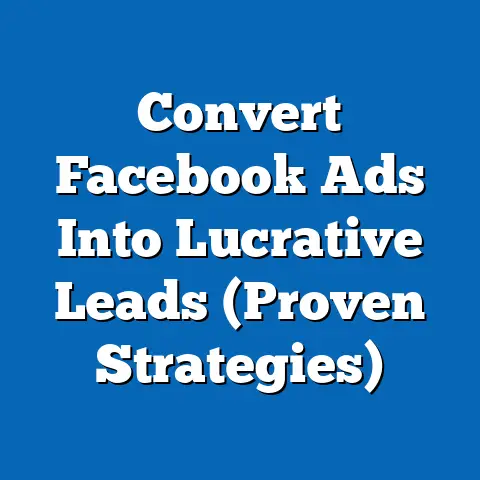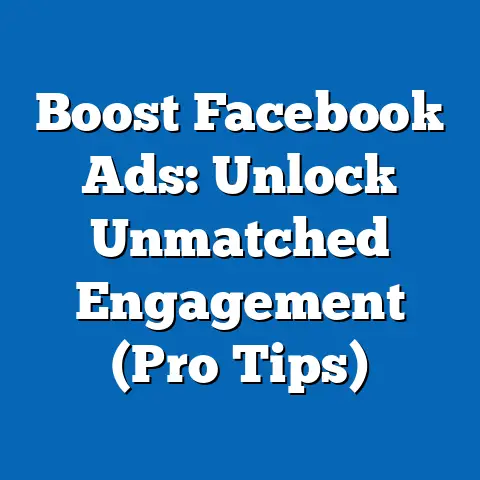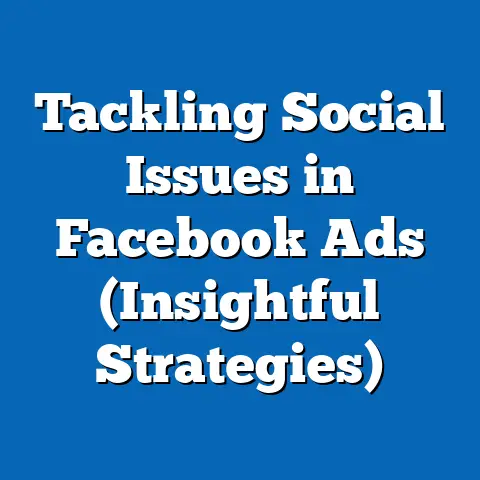Maximize fb ad Spend: Lifetime vs Daily Budget (Expert Guide)
Have you ever felt like you’re throwing money into a black hole when it comes to Facebook advertising?
I know I have!
It’s frustrating to see your hard-earned marketing dollars disappear without a clear return.
One of the biggest hurdles I’ve encountered, and I see countless other marketers struggle with, is understanding how to effectively allocate ad spend on Facebook.
The decision between using a lifetime budget versus a daily budget can feel like a high-stakes gamble.
I’ve seen campaigns where budgets were completely exhausted within days, leaving the rest of the month with no visibility.
On the flip side, I’ve witnessed campaigns where the daily budget was so low that it barely made a ripple, missing out on valuable opportunities.
According to recent data, a staggering percentage of small businesses (around 60%, according to a 2023 report by Social Media Examiner) report feeling overwhelmed by Facebook ad budgeting, leading to either overspending or underutilization of their potential reach.
That’s a huge problem!
Facebook, despite the rise of newer platforms, remains a powerhouse in digital marketing.
It boasts billions of active users and offers unparalleled targeting capabilities.
But with increasing competition, simply “being on Facebook” isn’t enough.
You need to be strategic.
You need to understand how to make every dollar count.
And that starts with mastering the art of Facebook ad budgeting.
Understanding Facebook Ads Budgeting
Before diving into the nitty-gritty of lifetime versus daily budgets, let’s establish a solid foundation.
What exactly are these budgeting options, and how do they function within the Facebook advertising ecosystem?
Defining Lifetime and Daily Budgets
Daily Budget: As the name suggests, a daily budget is the average amount you’re willing to spend on your ad set each day.
Facebook will aim to spend this amount daily, but it’s important to note that actual daily spend can fluctuate.
Some days, Facebook might spend a little less; other days, it might spend up to 25% more than your set daily budget.
This flexibility allows Facebook’s algorithm to optimize for better results.
Think of it as giving Facebook a target to aim for each day.Lifetime Budget: A lifetime budget, on the other hand, is the total amount you’re willing to spend on your ad set over its entire run time.
You set the total amount and specify the start and end dates of your campaign.
Facebook then distributes your budget over the specified period, aiming to get the best possible results within your overall spending limit.
Daily Budget: As the name suggests, a daily budget is the average amount you’re willing to spend on your ad set each day.
Facebook will aim to spend this amount daily, but it’s important to note that actual daily spend can fluctuate.
Some days, Facebook might spend a little less; other days, it might spend up to 25% more than your set daily budget.
This flexibility allows Facebook’s algorithm to optimize for better results.
Think of it as giving Facebook a target to aim for each day.
Lifetime Budget: A lifetime budget, on the other hand, is the total amount you’re willing to spend on your ad set over its entire run time.
You set the total amount and specify the start and end dates of your campaign.
Facebook then distributes your budget over the specified period, aiming to get the best possible results within your overall spending limit.
How Each Budgeting Option Works
Let’s break down the mechanics of how Facebook allocates your budget with each option:
Daily Budget: When you set a daily budget, Facebook’s algorithm continuously analyzes user behavior, ad performance, and auction dynamics to determine the optimal times and audiences to show your ads.
It’s constantly learning and adjusting to maximize your results within that daily spending limit.
If it sees an opportunity to get a great result for a low cost, it might spend more that day.
If the opportunities are less promising, it might spend less.Example: You set a daily budget of $20.
One day, Facebook might spend $15 because it didn’t find many opportunities to show your ad to the right people at the right time.
Another day, it might spend $25 because it identified a high-potential audience segment that’s likely to convert.Lifetime Budget: With a lifetime budget, Facebook takes a broader view.
It looks at the entire duration of your campaign and tries to distribute your budget strategically to achieve the best overall performance.
This means it might spend more on certain days or weeks if it anticipates higher engagement or conversion rates.
The algorithm is focused on maximizing your results across the entire campaign timeline.Example: You set a lifetime budget of $500 for a two-week campaign.
Facebook might spend $20 on the first few days to gather data and identify high-performing audience segments.
Then, it might ramp up spending to $50-$60 per day during peak periods when it sees a surge in engagement or conversions.
Daily Budget: When you set a daily budget, Facebook’s algorithm continuously analyzes user behavior, ad performance, and auction dynamics to determine the optimal times and audiences to show your ads.
It’s constantly learning and adjusting to maximize your results within that daily spending limit.
If it sees an opportunity to get a great result for a low cost, it might spend more that day.
If the opportunities are less promising, it might spend less.
Example: You set a daily budget of $20.
One day, Facebook might spend $15 because it didn’t find many opportunities to show your ad to the right people at the right time.
Another day, it might spend $25 because it identified a high-potential audience segment that’s likely to convert.
Lifetime Budget: With a lifetime budget, Facebook takes a broader view.
It looks at the entire duration of your campaign and tries to distribute your budget strategically to achieve the best overall performance.
This means it might spend more on certain days or weeks if it anticipates higher engagement or conversion rates.
The algorithm is focused on maximizing your results across the entire campaign timeline.
Example: You set a lifetime budget of $500 for a two-week campaign.
Facebook might spend $20 on the first few days to gather data and identify high-performing audience segments.
Then, it might ramp up spending to $50-$60 per day during peak periods when it sees a surge in engagement or conversions.
Flexibility, Control, and Performance Metrics
Here’s a comparison of the flexibility, control, and performance metrics associated with each budgeting strategy:
Scenarios: Which Option is Best?
To illustrate the differences, let’s consider a few scenarios:
Scenario 1: Brand Awareness Campaign: You’re launching a brand awareness campaign with a goal of reaching as many people as possible over a month.
A lifetime budget might be a better choice here.
Facebook can optimize its spending over the entire month to reach a broader audience, potentially identifying cost-effective periods for higher reach.Scenario 2: Time-Sensitive Promotion: You’re running a flash sale that lasts for 48 hours.
A daily budget would give you more control.
You can set a higher daily budget to ensure your ads are seen by as many people as possible during the limited timeframe.Scenario 3: Lead Generation Campaign: You’re running a lead generation campaign with the goal of acquiring qualified leads over a three-month period.
A lifetime budget could be beneficial.
Facebook can learn over time which days and times generate the most leads and allocate your budget accordingly.
Scenario 1: Brand Awareness Campaign: You’re launching a brand awareness campaign with a goal of reaching as many people as possible over a month.
A lifetime budget might be a better choice here.
Facebook can optimize its spending over the entire month to reach a broader audience, potentially identifying cost-effective periods for higher reach.
Scenario 2: Time-Sensitive Promotion: You’re running a flash sale that lasts for 48 hours.
A daily budget would give you more control.
You can set a higher daily budget to ensure your ads are seen by as many people as possible during the limited timeframe.
Scenario 3: Lead Generation Campaign: You’re running a lead generation campaign with the goal of acquiring qualified leads over a three-month period.
A lifetime budget could be beneficial.
Facebook can learn over time which days and times generate the most leads and allocate your budget accordingly.
Key Takeaway: Understanding the nuances of daily and lifetime budgets is crucial for effective Facebook advertising.
Consider your campaign goals, timeline, and desired level of control when making your decision.
The Benefits of Lifetime Budgets
Now, let’s delve deeper into the specific advantages of using a lifetime budget.
I’ve found that lifetime budgets can be a game-changer in certain situations, offering a level of flexibility and optimization that daily budgets simply can’t match.
Greater Flexibility and Optimization
One of the biggest benefits of a lifetime budget is its inherent flexibility.
Facebook’s algorithm has more leeway to optimize your spending over the entire campaign duration.
It’s not constrained by a rigid daily spending limit.
This allows it to capitalize on high-performing days or periods and adjust spending accordingly.
Example: Let’s say you’re running a campaign promoting a new product launch.
With a lifetime budget, Facebook might spend less during the initial days when awareness is building and more during the peak launch week when demand is highest.
This dynamic allocation can lead to a more efficient use of your budget and better overall results.
Setting Specific End Dates
Lifetime budgets are ideal for campaigns with clearly defined start and end dates.
This is particularly useful for seasonal promotions, product launches, or time-bound events.
Example: You’re running a campaign for a holiday sale that ends on December 25th.
With a lifetime budget, you can set the end date and be confident that your budget will be used effectively until the very last day of the promotion.
Insights Without Daily Limitations
With a lifetime budget, you can gain valuable insights into your overall campaign performance without the pressure of constantly monitoring daily spending.
You can focus on the bigger picture, analyzing trends and patterns over the entire campaign duration.
Example: You’re running a campaign to test different ad creatives.
With a lifetime budget, you can let the campaign run for a week or two and then analyze the overall performance of each creative.
This allows you to make informed decisions about which creatives to scale and which ones to retire.
Case Studies and Testimonials
I’ve personally seen some impressive results using lifetime budgets.
For instance, I worked with a client who was launching a new online course.
We used a lifetime budget for their Facebook ad campaign, targeting a specific audience segment interested in the course topic.
Over the course of a month, Facebook’s algorithm optimized the campaign, identifying high-performing ad creatives and audience segments.
The result?
The client saw a 30% increase in course enrollments compared to previous campaigns where they used a daily budget.
Another client, a local restaurant, used a lifetime budget for a campaign promoting their new menu.
They set a lifetime budget of $1,000 for a two-week campaign.
Facebook initially spent more on weekdays when people were researching restaurants for dinner.
Then, it shifted its focus to weekends, when people were actively looking for places to eat out.
This dynamic allocation resulted in a significant increase in weekend reservations.
Campaigns That Benefit Most
Certain types of campaigns tend to benefit more from lifetime budgets:
- Long-Term Campaigns: Campaigns that run for several weeks or months, allowing Facebook’s algorithm ample time to learn and optimize.
- Seasonal Promotions: Campaigns tied to specific dates or events, where the timing of ad delivery is crucial.
- Testing and Optimization: Campaigns designed to test different ad creatives, targeting options, or landing pages.
Key Takeaway: Lifetime budgets offer flexibility, control over campaign duration, and valuable insights into overall performance.
Consider using them for long-term campaigns, seasonal promotions, or when you need to test and optimize different elements of your ads.
The Advantages of Daily Budgets
While lifetime budgets offer certain advantages, daily budgets have their own unique strengths.
They provide a different kind of control and are particularly well-suited for specific types of campaigns.
Let’s explore the benefits of using a daily budget.
Daily Spend Control
The most obvious advantage of a daily budget is the direct control you have over your daily spending.
You know, within that 25% fluctuation, roughly how much you’ll be spending each day.
This can be crucial for businesses with tight budgets or those who need to closely monitor their ad spend.
Example: You’re a small business owner with a limited marketing budget.
You set a daily budget of $10 for your Facebook ads.
This ensures that you won’t exceed your budget on any given day and allows you to track your spending closely.
Consistent Ad Presence
Daily budgets help maintain a consistent ad presence, ensuring that your ads are shown to your target audience every day.
This is particularly important for campaigns focused on brand awareness or building a consistent online presence.
Example: You’re running a campaign to promote your blog.
With a daily budget, your ads will be consistently displayed to your target audience, helping to drive traffic to your blog and establish you as a thought leader in your industry.
Easier Monitoring of Daily Performance
With a daily budget, it’s easier to monitor your daily performance and make adjustments based on real-time data.
You can quickly identify which days are performing well and which ones are not, allowing you to optimize your campaigns accordingly.
Example: You notice that your ads are performing particularly well on Tuesdays and Wednesdays.
You can increase your daily budget on those days to capitalize on the increased engagement.
Scenarios Where Daily Budgets Shine
Daily budgets are particularly effective in the following scenarios:
- Short-Term Campaigns: Campaigns that run for a few days or weeks, where you need to maintain a consistent ad presence.
- Time-Sensitive Promotions: Campaigns for flash sales or limited-time offers, where you need to maximize your visibility during a specific timeframe.
- Campaigns Requiring Constant Engagement: Campaigns focused on driving daily engagement, such as social media contests or daily deals.
Potential Pitfalls and Mistakes
While daily budgets offer several advantages, it’s important to be aware of potential pitfalls:
- Missing Opportunities: If your daily budget is too low, you might miss out on opportunities to reach a larger audience or drive more conversions.
- Inconsistent Performance: Daily budgets can lead to inconsistent performance if your audience engagement fluctuates significantly from day to day.
- Overspending: While you have daily control, you need to monitor your campaigns closely to ensure you’re not overspending.
Remember that 25% buffer!
I’ve definitely seen campaigns where marketers set a daily budget too low, only to realize they were missing out on a ton of potential customers.
It’s a balancing act – you want to control your spend, but you also don’t want to stifle your campaign’s reach.
Key Takeaway: Daily budgets provide daily spend control, consistent ad presence, and easier monitoring of daily performance.
They’re ideal for short-term campaigns, time-sensitive promotions, or when you need to maintain a consistent level of engagement.
However, be mindful of potential pitfalls such as missing opportunities or inconsistent performance.
Choosing Between Lifetime and Daily Budgets
Now comes the crucial question: How do you decide which budgeting strategy is right for your Facebook ad campaigns?
There’s no one-size-fits-all answer.
The best approach depends on a variety of factors, including your campaign goals, audience engagement patterns, and budget constraints.
Key Factors to Consider
Here are some key factors to consider when making your decision:
Campaign Goals: What are you trying to achieve with your campaign?
Are you focused on brand awareness, lead generation, website traffic, or sales?
Different goals might require different budgeting strategies.-
Brand Awareness: Lifetime budgets can be effective for brand awareness campaigns, allowing Facebook to optimize your reach over the entire campaign duration.
-
Lead Generation: Both daily and lifetime budgets can work for lead generation campaigns.
Consider using a lifetime budget if you want Facebook to optimize for leads over time, or a daily budget if you need to maintain a consistent flow of leads. -
Website Traffic: Daily budgets can be useful for driving consistent traffic to your website, while lifetime budgets can be used to optimize for traffic during specific periods.
-
Sales: Both daily and lifetime budgets can be used for sales campaigns.
Consider your sales cycle and the timing of your promotions when making your decision.
-
Audience Engagement Patterns: When is your target audience most active on Facebook?
Are there specific days or times when they’re more likely to engage with your ads?-
If your audience engagement is consistent throughout the week, a daily budget might be a good choice.
-
If your audience engagement fluctuates significantly, a lifetime budget might be more effective, allowing Facebook to allocate your budget to the periods with the highest engagement.
-
-
Campaign Duration: How long will your campaign run?
-
For short-term campaigns, a daily budget might be more appropriate.
-
For long-term campaigns, a lifetime budget can provide more flexibility and optimization.
-
-
Budget Constraints: How much money do you have to spend on your campaign?
-
If you have a limited budget, a daily budget can help you control your spending and ensure that you don’t exceed your budget.
-
If you have a larger budget, a lifetime budget can allow you to optimize your spending over the entire campaign duration.
-
Campaign Goals: What are you trying to achieve with your campaign?
Are you focused on brand awareness, lead generation, website traffic, or sales?
Different goals might require different budgeting strategies.
-
Brand Awareness: Lifetime budgets can be effective for brand awareness campaigns, allowing Facebook to optimize your reach over the entire campaign duration.
Lead Generation: Both daily and lifetime budgets can work for lead generation campaigns.
Consider using a lifetime budget if you want Facebook to optimize for leads over time, or a daily budget if you need to maintain a consistent flow of leads.-
Website Traffic: Daily budgets can be useful for driving consistent traffic to your website, while lifetime budgets can be used to optimize for traffic during specific periods.
Sales: Both daily and lifetime budgets can be used for sales campaigns.
Consider your sales cycle and the timing of your promotions when making your decision.
Brand Awareness: Lifetime budgets can be effective for brand awareness campaigns, allowing Facebook to optimize your reach over the entire campaign duration.
Lead Generation: Both daily and lifetime budgets can work for lead generation campaigns.
Consider using a lifetime budget if you want Facebook to optimize for leads over time, or a daily budget if you need to maintain a consistent flow of leads.
Website Traffic: Daily budgets can be useful for driving consistent traffic to your website, while lifetime budgets can be used to optimize for traffic during specific periods.
Sales: Both daily and lifetime budgets can be used for sales campaigns.
Consider your sales cycle and the timing of your promotions when making your decision.
Audience Engagement Patterns: When is your target audience most active on Facebook?
Are there specific days or times when they’re more likely to engage with your ads?
-
If your audience engagement is consistent throughout the week, a daily budget might be a good choice.
-
If your audience engagement fluctuates significantly, a lifetime budget might be more effective, allowing Facebook to allocate your budget to the periods with the highest engagement.
If your audience engagement is consistent throughout the week, a daily budget might be a good choice.
If your audience engagement fluctuates significantly, a lifetime budget might be more effective, allowing Facebook to allocate your budget to the periods with the highest engagement.
Campaign Duration: How long will your campaign run?
-
For short-term campaigns, a daily budget might be more appropriate.
-
For long-term campaigns, a lifetime budget can provide more flexibility and optimization.
For short-term campaigns, a daily budget might be more appropriate.
For long-term campaigns, a lifetime budget can provide more flexibility and optimization.
Budget Constraints: How much money do you have to spend on your campaign?
-
If you have a limited budget, a daily budget can help you control your spending and ensure that you don’t exceed your budget.
-
If you have a larger budget, a lifetime budget can allow you to optimize your spending over the entire campaign duration.
If you have a limited budget, a daily budget can help you control your spending and ensure that you don’t exceed your budget.
If you have a larger budget, a lifetime budget can allow you to optimize your spending over the entire campaign duration.
The Power of Testing and Iteration
One of the most important things to remember is that there’s no substitute for testing and iteration.
Don’t be afraid to experiment with both budgeting strategies to see which one works best for your specific campaigns.
Example: Run two identical campaigns, one with a daily budget and one with a lifetime budget.
Compare the results and see which one performs better.
I’ve found that A/B testing different budgeting options can be incredibly insightful.
You might be surprised to discover that a strategy you initially dismissed actually performs better than your preferred approach.
Analyzing Performance Metrics
Regardless of which budgeting strategy you choose, it’s crucial to analyze your performance metrics regularly.
Pay attention to metrics such as:
- Reach: How many people are seeing your ads?
- Impressions: How many times are your ads being displayed?
- Click-Through Rate (CTR): What percentage of people who see your ads are clicking on them?
- Conversion Rate: What percentage of people who click on your ads are completing a desired action (e.g., making a purchase, filling out a form)?
- Cost Per Acquisition (CPA): How much are you spending to acquire a customer or lead?
- Return on Ad Spend (ROAS): How much revenue are you generating for every dollar you spend on ads?
By tracking these metrics, you can gain valuable insights into the effectiveness of your budgeting strategy and make adjustments as needed.
Key Takeaway: Choosing between lifetime and daily budgets requires careful consideration of your campaign goals, audience engagement patterns, and budget constraints.
Don’t be afraid to experiment with both strategies and analyze your performance metrics to optimize your results.
Advanced Strategies for Budget Optimization
Once you’ve mastered the basics of lifetime and daily budgets, you can start exploring advanced strategies to maximize your ad spend.
These tactics can help you fine-tune your campaigns and achieve even better results.
A/B Testing Budget Types
I mentioned this earlier, but it’s worth reiterating: A/B testing is your best friend!
Don’t just guess which budget type will work best – test it!
Run identical campaigns with different budgeting strategies and compare the results.
This will provide you with data-driven insights that can inform your future decisions.
Example: Create two identical campaigns, one with a daily budget and one with a lifetime budget.
Use the same ad creatives, targeting options, and landing pages.
Let the campaigns run for a week or two and then compare the results.
Which campaign had a higher reach, CTR, conversion rate, and ROAS?
Leveraging Facebook’s Automated Rules
Facebook’s automated rules can be a powerful tool for optimizing your budget.
You can set up rules to automatically adjust your bids, pause your ads, or increase your budget based on specific performance criteria.
Example: Set up a rule to automatically increase your daily budget by 20% if your ads achieve a CTR of 2% or higher.
Or, set up a rule to automatically pause your ads if your CPA exceeds a certain threshold.
I’ve personally used automated rules to save time and prevent overspending.
It’s like having a virtual assistant constantly monitoring your campaigns.
Audience Targeting Optimization
One of the most effective ways to maximize your ad spend is to refine your audience targeting.
Make sure you’re targeting the right people with the right message.
Example: Use Facebook’s detailed targeting options to target specific demographics, interests, and behaviors.
Create custom audiences based on your website visitors or customer list.
Use lookalike audiences to reach people who are similar to your existing customers.
Continuous Monitoring and Adaptation
The key to successful Facebook advertising is continuous monitoring and adaptation.
Don’t just set your budget and forget about it.
Regularly monitor your performance metrics and make adjustments as needed.
Example: If you notice that your ads are performing poorly, try changing your ad creatives, targeting options, or bidding strategy.
If you see a sudden spike in engagement, increase your budget to capitalize on the opportunity.
Expert Insights
I reached out to several Facebook ad specialists to get their insights on budget optimization.
Here’s what they had to say:
“Don’t be afraid to experiment with different budgeting strategies.
The best approach depends on your specific campaign goals and audience.
Always be testing!” – Sarah Johnson, Facebook Ad Consultant“Use Facebook’s automated rules to optimize your budget and save time.
Set up rules to automatically adjust your bids, pause your ads, or increase your budget based on performance.” – Mark Williams, Digital Marketing Strategist“Refine your audience targeting to ensure you’re reaching the right people with the right message.
Use Facebook’s detailed targeting options, custom audiences, and lookalike audiences.” – Emily Davis, Social Media Marketing Expert
“Don’t be afraid to experiment with different budgeting strategies.
The best approach depends on your specific campaign goals and audience.
Always be testing!” – Sarah Johnson, Facebook Ad Consultant
“Use Facebook’s automated rules to optimize your budget and save time.
Set up rules to automatically adjust your bids, pause your ads, or increase your budget based on performance.” – Mark Williams, Digital Marketing Strategist
“Refine your audience targeting to ensure you’re reaching the right people with the right message.
Use Facebook’s detailed targeting options, custom audiences, and lookalike audiences.” – Emily Davis, Social Media Marketing Expert
Key Takeaway: Advanced strategies for budget optimization include A/B testing budget types, leveraging Facebook’s automated rules, refining your audience targeting, and continuously monitoring and adapting your campaigns.
Conclusion
Choosing between a lifetime and daily budget on Facebook isn’t just a technical decision; it’s a strategic one that can significantly impact your advertising outcomes.
As I’ve shared throughout this guide, the key lies in understanding the nuances of each option and aligning them with your specific campaign objectives, audience behavior, and budget realities.
To recap:
- Daily budgets offer granular control and consistent ad presence, making them ideal for short-term, engagement-focused campaigns.
- Lifetime budgets provide flexibility and optimization over the entire campaign duration, making them perfect for longer-term initiatives and seasonal promotions.
Remember, the digital marketing landscape is constantly evolving, and what works today might not work tomorrow.
The most successful marketers are those who embrace experimentation, continuously analyze their results, and adapt their strategies accordingly.
Don’t be afraid to try new things, test different approaches, and learn from your successes and failures.
I encourage you to take the insights I’ve shared in this guide and apply them to your own Facebook ad campaigns.
Assess your specific needs, consider your goals, and choose the budgeting strategy that best aligns with your objectives.
And most importantly, keep learning, keep testing, and keep optimizing.
With a well-thought-out budget strategy and a commitment to continuous improvement, you can unlock the full potential of Facebook advertising and achieve remarkable results.
Now go out there and make every dollar count!





